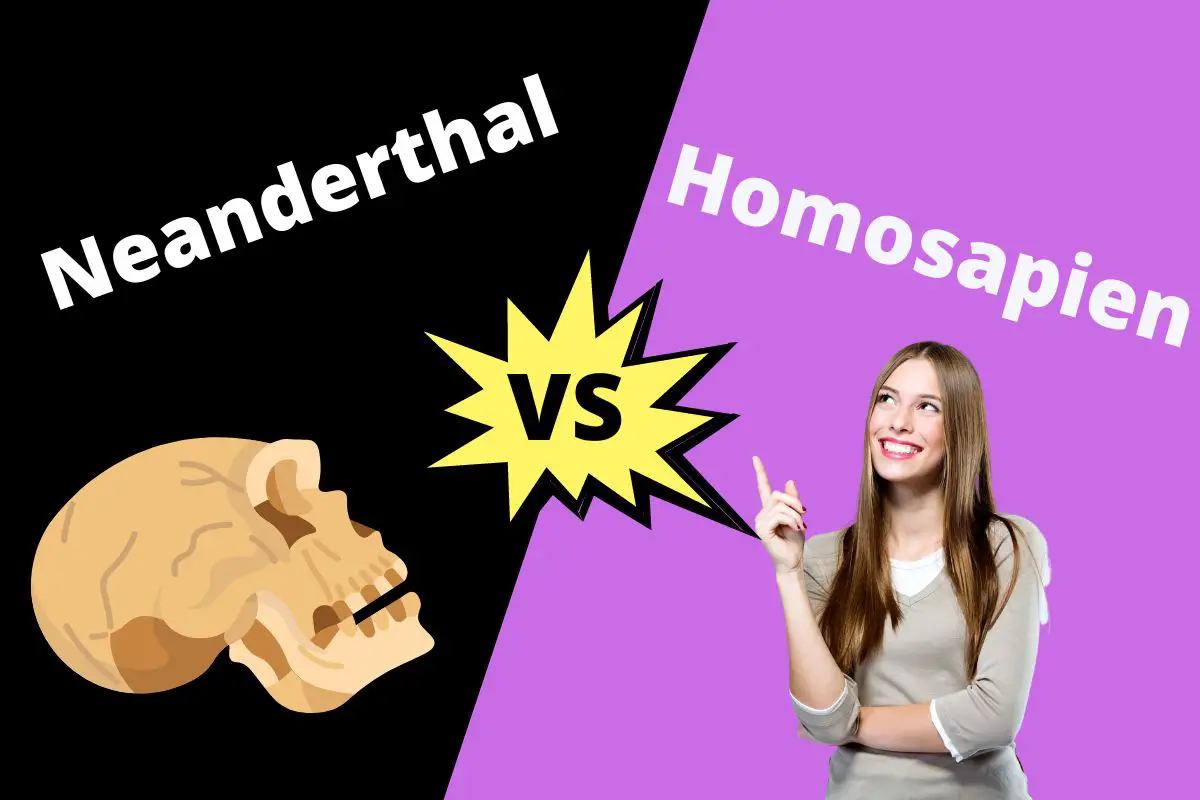Neanderthals are an extinct genus similar to humans who lived almost 40,000 years ago. Homosapiens are present-day humans living on this planet.
There is a lot to explore about these different species, which we are about to do in this article. Let’s dive in and see a detailed comparison between Neanderthals and Homosapiens.
Table of Contents
Neanderthal vs Homosapien
| Neanderthal | vs | Homosapien |
| Neanderthalensis | Scientific name | Homo sapiens Homo Sapiens |
| Extinct | Status | Living |
| Lived in cold and arid conditions, mainly in Eurasia | Location | Live worldwide and in all climates, regions, and environments |
| The average height for men is 5ft 6 inches and for women is 5ft | Height | Average height for men is 5ft 9 inches and for women is 5ft 4 inches |
| Barrel-shaped chest | Chest shape | Standard |
| Shorter limbs and lower legs and lower arms | Limbs | Long limbs |
| Strong, robust bones with a wide pelvis | Bones | Thin bones, not as strong as the Neanderthals, and narrow pelvis |
| Thicker | Metacarpals | Thinner |
| Asymmetrical | Humerus | Symmetrical |
| Larger roots, larger front teeth, and large pulp cavities in molars. Neanderthals develop teeth much faster than modern homo sapiens | Teeth | Smaller teeth and two equal-sized cups in lower premolars |
| Elongated skull, prominent brow ridge, and broad nose | Skull | Round, small skull and no brow ridge |
| 80% of Neanderthals died before the age of 40 | Lifespan | Varies based on living conditions, but the average is 70 years for men and 75 for women |
| Stronger | Strength | Relatively weaker |
| Carnivorous. They hunted and ate large animals like boars, deer, rhinos, elephants, etc. | Diet | Omnivorous. They eat both plant-based and meat products |
What are Neanderthals?
Neanderthals are archaic humans that lived 2,500,000-40,000 years ago in Europe and Western Asia.
Multiple pieces of evidence, like fossil records and stone tools assemblages, have validated their existence. The scientific names for these extinct species are Homo Neanderthalensis or Homo Sapiens Neanderthalensis.
Neanderthals lived in colder weather, so their preferred locations were Russia or Europe.
For a long time, people believed that we evolved from Neanderthals. Still, recent discoveries reveal that they are the early human ancestors or our most recent relatives.
There are similarities between Neanderthal DNA and Homosapien DNA, and the physical features are similar to modern humans.

What are Homosapiens?
Homosapiens are modern-day humans living currently, and they evolved in Africa about 200,000 years ago.
Homosapiens are also called wise men because they are the most discerning among all separate species, such as: Homo erectus, Homo rudolfensis, Homo habilis, etc., living on this planet so far.

Neanderthal vs Homosapien: Key Differences
Here are the main factors based on which we can differentiate between Neanderthals and Homosapiens.
Skull
Physical features are one of the most prominent differentiating factors between Homosapiens and Neanderthals.
Neanderthals have an elongated skull compared to the round-shaped skull of Homosapiens. The Neanderthal brains had a raised larynx, and the longer skull shape of Neanderthals allowed them to have a larger brain than an average human.
Plus, they had prominent brow ridges and a larger nose. Additionally, they had a sloped forehead and a small chin compared to Homosapiens.
Teeth
You can distinguish between a Neanderthal and a Homosapien through their teeth. According to scientists, Neanderthals developed teeth even before birth, meaning their teeth grew faster than Homosapien teeth.
Also, Neanderthal teeth had much larger roots, more prominent front teeth, a bigger gap behind the third molar, and enlarged pulp cavities in the molar.
Height
Homosapiens are taller than Neanderthals. Even though height varies for Homosapiens based on country of origin, gender, race, and living conditions, the average height for H. sapiens is 5ft, 9 inches for men, and 5ft, 4 inches for women.
But a Neanderthal male grew to about 5’6″ and about 5′ for females. Their shorter limbs and low-hanging arms account for their shorter height.
Bones
The list of differences between Homosapiens and Neanderthals continues with their bone structures. Neanderthals have stronger, thicker bones and thicker metacarpals with a solid disposition to suit their rugged lifestyle.
Homosapiens don’t have bones as strong as the Neanderthals’s. Still, Homosapiens have a symmetrical humerus compared with the asymmetrical humerus of the Neanderthals.
On the other hand, Neanderthals have long and thick vertebrates to provide stability to their large skulls.
Body Shape
The body shapes of Homosapiens and Neanderthals differ greatly. Homosapiens or modern humans have a narrow pelvis and a standard chest shape. However, Neanderthals had a wider pelvis and barrel-shaped chest.
The barrel-shaped chest had long and straight ribs allowing better lung capacity.
Differentiating Between These Creatures
Hopefully, now you have enough idea about Neanderthals and Homosapiens. Fossil evidence shows Neanderthals are one of our common ancestors living thousands of years ago on this planet.
What sets them apart from modern human beings is their robust physical structure required to adapt to their rough living conditions.
If you enjoyed this article, check out our post on homozygous and heterozygous cells.

